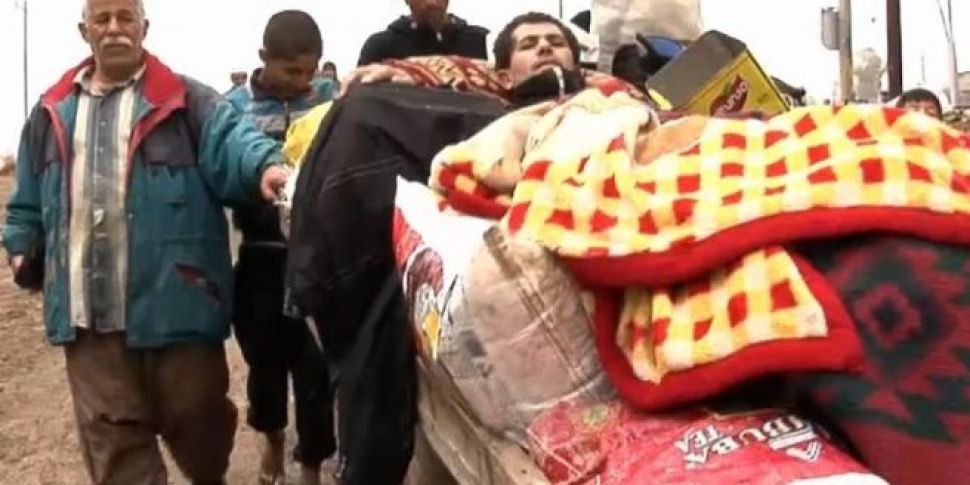Some 10,000 to 12,000 refugees are fleeing the western part of Mosul every day - a great exodus from a city that once numbered five million.
Residents have been driven out by heavy shelling and street-to-street combat between the Iraqi Army and Islamic State - but they are also exhausted and desperately hungry.
Lisa Grande, the person leading the UN's humanitarian response in the country, has spent her career working in some of the largest humanitarian crises in the world and knows the next one lurks just around the corner in Iraq.
She said: "There's something that people do not realise. The successful protection and, if necessary, relocation of residents from west Mosul is just as important as the battle for the city itself."
With parts of IS-controlled west Mosul under siege by the Iraqis, the price of basic supplies has skyrocketed.
"It is a catastrophe," one woman told Sky News as she boarded a bus for the refugee camps.
"There is famine, there is hunger. One kilo of onions costs 180,000 dinars (£122). One kilo of sugar is one million to 1.4 million dinars (£680-950). This is my neighbourhood."
Their requirements are straightforward and immediate - a place to stay, food and clean water, and health care to keep people alive.
What is in doubt however, is the ability of multiple bodies to provide it to it to the extraordinary numbers involved.
UN agencies struggle to keep up
New camps are being built and established ones expanded, but nine Iraqi government ministries, three regional governments, five UN agencies and multiple NGOs are struggling to keep up.
It is something that Ms Grande is open about.
She said: "The numbers here are higher than expected and if the pace accelerates further, it's going to stretch us to the breaking point."
Finding a tent for every evacuee may be the biggest challenge of them all and an Iraqi general called Basim al Taee is the man ultimately responsible.
Sky News met the man at a waterlogged spot in a town called Hammam al Alil and he told them that UN agencies had not been acting quickly enough.
"We have a problem with resettlement. The United Nations has been slow in finishing the camps… there is a problem with bureaucracy," he said.
"We call on the UN and the (provincial governments) to finish these camps."
According to Sky, there is certainly a problem in Hammam al Alil. The Iraqis have set up a reception centre in the town through which every Mosul evacuee must pass.
The males are screened by intelligence officers looking for members of IS - while the women start searching for a place to stay.
Unsurprisingly, the refugee camp attached to this centre is absolutely crammed - "the place is an absolute disaster," one senior humanitarian administrator told John Sparks, Sky News Correspondent.
The general told the team he hoped to have another 10,000 tents ready this week but co-ordination is clearly an issue.
Chaos as lack of supplies affects camps
They watched him field dozens of requests and complaints from refugees and members of NGOs. At one point he lost his temper: "I am responsible here, they didn't co-ordinate with me, they can **** off."
Upon their entry into one of the kitchen tents on site, which is operated by the provincial government, the staff told them they had no gas or ingredients to cook with.
Mr Sparks watched as General Basim took out a bundle of banknotes from his pocket and handed them over to the cook.
"I had to pay them out of my own pocket," said the 37-year military veteran, shaking his head.
Ms Grande says UN teams and partner agencies are doing the very best they can but says they are working in an very challenging environment.
"Our partners and staff have received authorisation from the Iraqis to build camps and sanitation facilities, only to find that authorisation has been rescinded - whether it is by a government ministry or a local official - for reasons which aren't clear or justified. It isn't easy," she said.
It is essential, however, that the relocation of Mosul's population is done competently and that people are returned to their homes voluntarily, safely and in dignity - this, perhaps, is Ms Grande's most important point.
The majority of its residents are Sunni - a largely disenfranchised, minority group in Iraq - and some members will find themselves attracted to the call of extremists if despair sets in.









